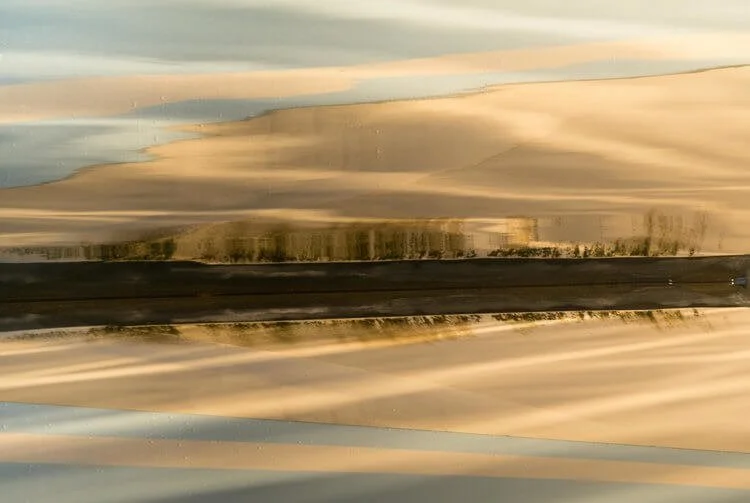The Mercurial Photos of Ralph Kerle - Trophies or Gifts
by Dr Gary Willis, artist, academic and artistic confidante.
It is a question that I imagine most photographers must have faced, ‘Do I hunt my images down like a trophy or do they offer themselves up to me like gifts?’ Several years ago Ralph Kerle was a recreational kayacker. He found paddling around the tidal backwaters of Middle Harbor on Sunday mornings gave him tremendous peace of mind. That’s all – he had no other agenda.
One such Sunday morning Ralph was religiously paddling between Seaforth and Castlecrag; the waters were mercurial, not a breath of wind nor a cloud in the sky. Suddenly he was stuck by an image waving at him through the water as if in a mirror gently rolling with the swell. It was the reflection of a moored yacht. The vividness of the image left him spellbound. Eventually he reached for his phone, opening his camera app. framed-up the image took a snap and promptly forgot about it.
It was sometime before he got around to uploading the shot to his hard drive but when it opened up on his monitor he was staggered by the image. It wasn't the scene he had remembered. The camera had stripped the image of all familiarizing context and left an image with a life of its own. Since then Ralph has been mastering his cameras and developing elaborate processes to facilitate such images. We might be tempted to imagine the photographer out on Middle Harbor hunting down his images like trophies; but that is not how Ralph describes it.
Ralph recognizes his practice has evolved on the basis of a two-fold process;
1. The act of kayaking, as a meditational practice of clearing the mind and letting go.
2. The process of photography as awaiting the moment when the landscape calls for its capture.
The question that Ralph muses upon is a variant on the chicken and the egg conundrum: Is it the state of mind that enables him to recognize these images or do the images offer themselves in response to his mindset. Clearly the images exist independent of the artist but without a specific mindset, Ralph wonders if he would ever be able to see them.
I am beginning to think these images are generated from a liminal space somewhere between my primordial subconscious and the ephemeral real that defines our unique existential experience? Have I, through the deeply meditational experience of kayaking, solo on Sydney Harbor, tapped into a source that is otherwise lost to our everyday consciousness? And if so what is this mysterious phenomenon – how can I define it?
Ralph credits the nascent sensitivity that comes of his meditational outlook for his ability to recognize these images; is it only in this state that the landscape offers itself up to his camera. Ralph has no illusions about himself as the creator; that role clearly belongs to nature, he candidly explains. Ralph sees himself, as the one fortunate enough to have to have been ‘given’ the image and here is that question of ‘gift’. Derrida maintains by definition ‘gift’ cannot not belong to the exchange economy. One cannot barter for a gift; a gift is not only impossible it is ‘The Impossible’, he explains evoking George Bataille.[1]
Ralph’s mission onto Middle Harbour in his kayak on his regular paddles entails a letting go. In effect he gives everything away for that time out. These have been the terms of his deliverance for some years now. It is not an offering made in hope of exchange, but a sacrifice made to his meditation without hope or expectation. This act of sacrifice is what sets in train the transformation of his state of mind and only in this state can he seem to appreciate the gifts of nature.
Henry Hart, founding editor of Vesrse poetry journal and poet himself, acknowledges the ‘gift’ entailed in all art & poetry sets in train a moral force that engenders an equal and opposite response. The work of art exists between two economies, he explains, the gift economy and the market economy. However, although a work of art can exist without a market, Hart insists, ‘a work of art without gift is not a work of art’.[2]
Gary Willis PhD
Artist and Academic
(Montague 2016)
[1] Jacques Derrida ‘The Gift of Death’, ( USA, Chicago University Press , 1995,)
[2] Henry Hart, ‘Poetry as Gift,’ Swanee Review, Vol 122- No. 1 Winter 2014. (Johns Hopkins University Press,) Pp 55 74..

